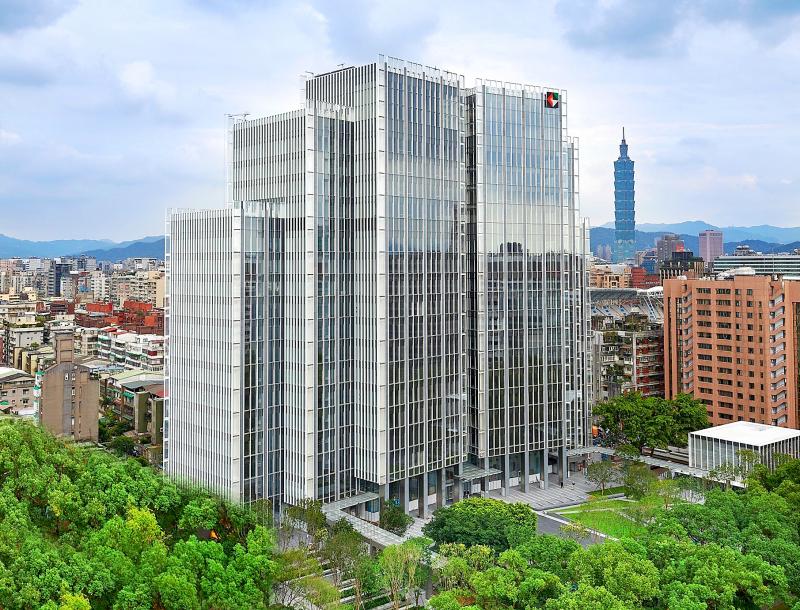China Development Financial Holding Corp’s (CDF, 中華開發金控) net profit in the first quarter edged downward from a year earlier because of lower investment gains and decreased earnings contributions from its investment and securities arms, the company told an investors’ conference yesterday.
The firm’s investment arm, CDIB Capital Group (中華開發資本), posted a net loss of NT$570 million (US$19.47 million) in the first quarter, compared with net profit of NT$1.62 billion a year earlier, because of investment declines.
Its securities arm, KGI Securities Ltd (凱基證券), posted net income of NT$1.37 billion, down 58 percent from a year earlier, as its trading business and bond investments were hit by market volatility.

Photo courtesy of China Development Financial Holding Co
Its life insurance unit, China Life Insurance Co (中國人壽), posted net profit of NT$8.08 billion, down 10 percent from a year earlier, due in part to credit losses of NT$1.5 billion related to Russian bond holdings.
However, as CDF fully acquired China Life on Dec. 30 last year, the holding company said it could recognize the insurer’s profit of NT$8.08 billion in the first quarter, up from the NT$4.43 billion it recognized a year earlier.
CDF said that China Life has become its most profitable unit.
The insurer posted a pre-hedge recurring rate of 3.15 percent, down from 3.25 percent a year earlier, but it reported a foreign exchange hedging gain of 0.08 percent, compared with a hedging cost of 1.49 percent a year earlier.
The insurer would primarily invest in US bonds and local stocks offering high dividends, president Stephanie Hwang (黃淑芬) said.
Banking unit KGI Bank (凱基銀行) posted net profit of NT$1.33 billion, up 26 percent, due to higher net income and net fee income.
CDF seeks good targets for mergers and acquisitions (M&As) in Taiwan and Southeast Asia to create synergy, chief executive officer Steve Bertamini told investors.
The firm hopes to boost its return on equity by a double-digit percentage through M&As over the next three to four years, he said.
Bertamini’s remarks came after CDF’s board of directors in April approved a plan to raise funds via a private placement of 2.5 billion common stock or preferred stock.

SEEKING CLARITY: Washington should not adopt measures that create uncertainties for ‘existing semiconductor investments,’ TSMC said referring to its US$165 billion in the US Taiwan Semiconductor Manufacturing Co (TSMC, 台積電) told the US that any future tariffs on Taiwanese semiconductors could reduce demand for chips and derail its pledge to increase its investment in Arizona. “New import restrictions could jeopardize current US leadership in the competitive technology industry and create uncertainties for many committed semiconductor capital projects in the US, including TSMC Arizona’s significant investment plan in Phoenix,” the chipmaker wrote in a letter to the US Department of Commerce. TSMC issued the warning in response to a solicitation for comments by the department on a possible tariff on semiconductor imports by US President Donald Trump’s

The government has launched a three-pronged strategy to attract local and international talent, aiming to position Taiwan as a new global hub following Nvidia Corp’s announcement that it has chosen Taipei as the site of its Taiwan headquarters. Nvidia cofounder and CEO Jensen Huang (黃仁勳) on Monday last week announced during his keynote speech at the Computex trade show in Taipei that the Nvidia Constellation, the company’s planned Taiwan headquarters, would be located in the Beitou-Shilin Technology Park (北投士林科技園區) in Taipei. Huang’s decision to establish a base in Taiwan is “primarily due to Taiwan’s talent pool and its strength in the semiconductor

An earnings report from semiconductor giant and artificial intelligence (AI) bellwether Nvidia Corp takes center stage for Wall Street this week, as stocks hit a speed bump of worries over US federal deficits driving up Treasury yields. US equities pulled back last week after a torrid rally, as investors turned their attention to tax and spending legislation poised to swell the US government’s US$36 trillion in debt. Long-dated US Treasury yields rose amid the fiscal worries, with the 30-year yield topping 5 percent and hitting its highest level since late 2023. Stocks were dealt another blow on Friday when US President Donald

UNCERTAINTY: Investors remain worried that trade negotiations with Washington could go poorly, given Trump’s inconsistency on tariffs in his second term, experts said The consumer confidence index this month fell for a ninth consecutive month to its lowest level in 13 months, as global trade uncertainties and tariff risks cloud Taiwan’s economic outlook, a survey released yesterday by National Central University found. The biggest decline came from the timing for stock investments, which plunged 11.82 points to 26.82, underscoring bleak investor confidence, it said. “Although the TAIEX reclaimed the 21,000-point mark after the US and China agreed to bury the hatchet for 90 days, investors remain worried that the situation would turn sour later,” said Dachrahn Wu (吳大任), director of the university’s Research Center for